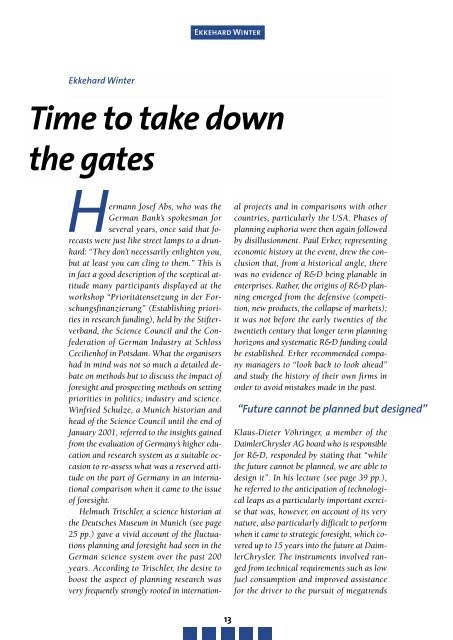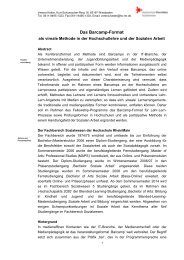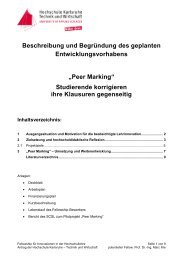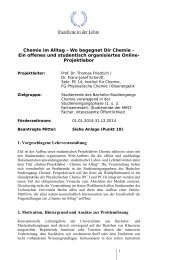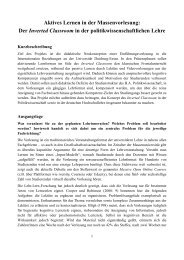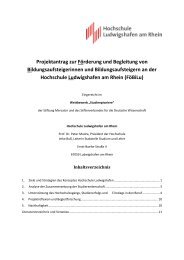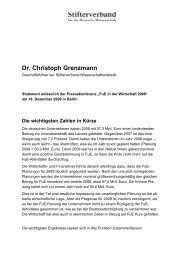Foresight - Stifterverband für die Deutsche Wissenschaft
Foresight - Stifterverband für die Deutsche Wissenschaft
Foresight - Stifterverband für die Deutsche Wissenschaft
Sie wollen auch ein ePaper? Erhöhen Sie die Reichweite Ihrer Titel.
YUMPU macht aus Druck-PDFs automatisch weboptimierte ePaper, die Google liebt.
Ekkehard Winter<br />
Hermann Josef Abs, who was the<br />
German Bank’s spokesman for<br />
several years, once said that forecasts<br />
were just like street lamps to a drunkard:<br />
“They don’t necessarily enlighten you,<br />
but at least you can cling to them.” This is<br />
in fact a good description of the sceptical attitude<br />
many participants displayed at the<br />
workshop “Prioritätensetzung in der Forschungsfinanzierung”<br />
(Establishing priorities<br />
in research funding), held by the <strong>Stifterverband</strong>,<br />
the Science Council and the Confederation<br />
of German Industry at Schloss<br />
Cecilienhof in Potsdam. What the organisers<br />
had in mind was not so much a detailed debate<br />
on methods but to discuss the impact of<br />
foresight and prospecting methods on setting<br />
priorities in politics, industry and science.<br />
Winfried Schulze, a Munich historian and<br />
head of the Science Council until the end of<br />
January 2001, referred to the insights gained<br />
from the evaluation of Germany’s higher education<br />
and research system as a suitable occasion<br />
to re-assess what was a reserved attitude<br />
on the part of Germany in an international<br />
comparison when it came to the issue<br />
of foresight.<br />
Helmuth Trischler, a science historian at<br />
the <strong>Deutsche</strong>s Museum in Munich (see page<br />
25 pp.) gave a vivid account of the fluctuations<br />
planning and foresight had seen in the<br />
German science system over the past 200<br />
years. According to Trischler, the desire to<br />
boost the aspect of planning research was<br />
very frequently strongly rooted in internation-<br />
Ekkehard Winter..<br />
Time to take down<br />
the gates<br />
13<br />
al projects and in comparisons with other<br />
countries, particularly the USA. Phases of<br />
planning euphoria were then again followed<br />
by disillusionment. Paul Erker, representing<br />
economic history at the event, drew the conclusion<br />
that, from a historical angle, there<br />
was no evidence of R&D being planable in<br />
enterprises. Rather, the origins of R&D planning<br />
emerged from the defensive (competition,<br />
new products, the collapse of markets);<br />
it was not before the early twenties of the<br />
twentieth century that longer term planning<br />
horizons and systematic R&D funding could<br />
be established. Erker recommended company<br />
managers to “look back to look ahead”<br />
and study the history of their own firms in<br />
order to avoid mistakes made in the past.<br />
“Future cannot be planned but designed”<br />
Klaus-Dieter Vöhringer, a member of the<br />
DaimlerChrysler AG board who is responsible<br />
for R&D, responded by stating that “while<br />
the future cannot be planned, we are able to<br />
design it”. In his lecture (see page 39 pp.),<br />
he referred to the anticipation of technological<br />
leaps as a particularly important exercise<br />
that was, however, on account of its very<br />
nature, also particularly difficult to perform<br />
when it came to strategic foresight, which covered<br />
up to 15 years into the future at DaimlerChrysler.<br />
The instruments involved ranged<br />
from technical requirements such as low<br />
fuel consumption and improved assistance<br />
for the driver to the pursuit of megatrends


